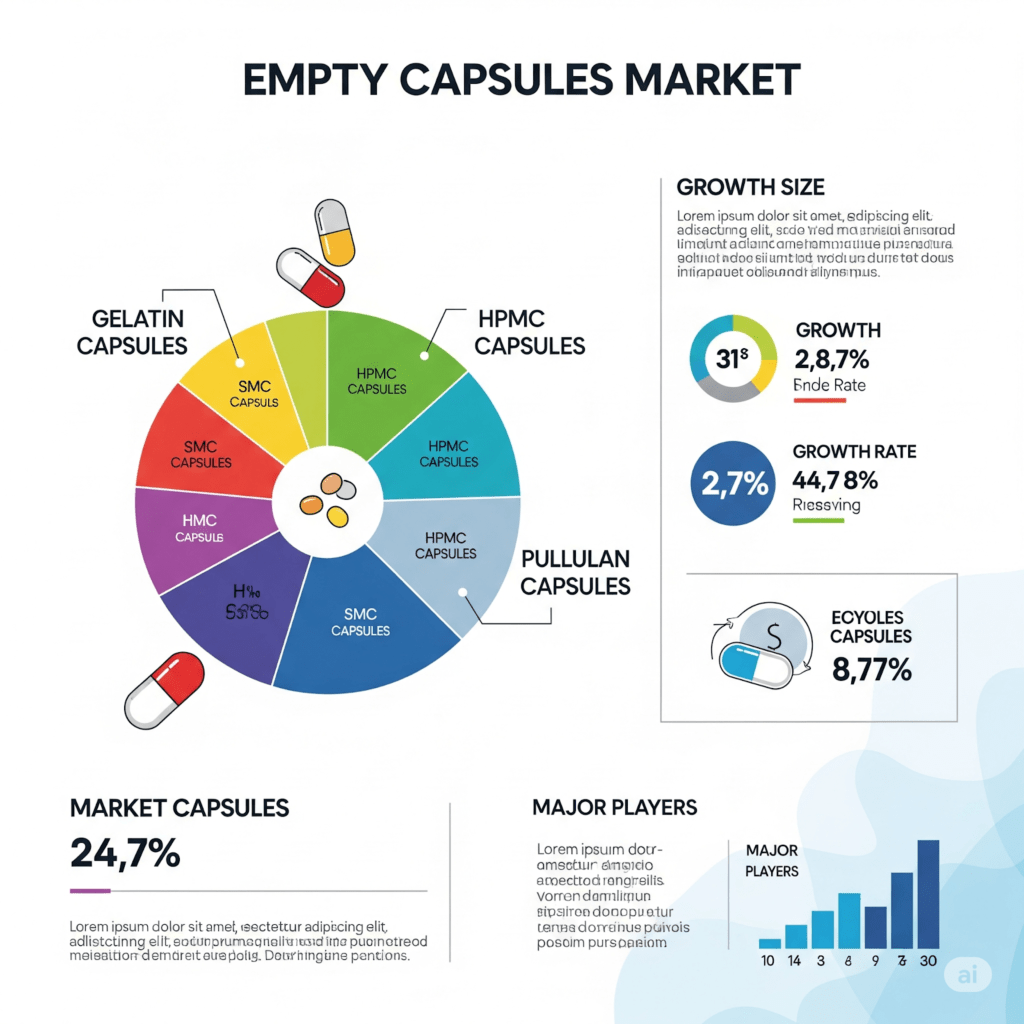Market Overview
Empty capsules are widely used as efficient delivery systems in the pharmaceutical, nutraceutical, and cosmetic industries. Their ability to encapsulate liquids, powders, granules, and semi-solids makes them ideal for delivering precise doses of active ingredients. With the growing demand for health supplements, clean-label products, and personalized medicine, the Empty Capsules Market is expanding significantly across both developed and emerging regions.
The market is segmented by Product Type (Gelatin and Non-Gelatin Capsules), Application (Antibiotics, Vitamins, Anti-inflammatory, Anti-anemic, and Others), End User (Pharmaceutical Drug Manufacturers, Nutraceutical Product Manufacturers, Cosmetics Manufacturers, and Research Organizations), and Region (North America, Europe, Asia Pacific, Latin America, Middle East, and Africa).
Market Drivers
1. Rising Demand for Nutraceuticals and Dietary Supplements
Health-conscious consumers are increasingly turning to vitamins, herbal extracts, and dietary supplements for preventive care. This shift has driven up the demand for empty capsules, especially non-gelatin types such as HPMC and pullulan, known for their plant-based, vegan-friendly origins.
2. Growth in Geriatric and Pediatric Populations
Empty capsules offer convenience, accurate dosing, and ease of swallowing, making them ideal for children and elderly patients who may struggle with traditional tablets or syrups.
3. Advancements in Capsule Technology
Innovations such as delayed-release capsules, enteric coatings, and capsule-in-capsule designs have enhanced drug stability and targeted delivery. These advancements are increasing adoption among pharmaceutical manufacturers.
4. Increased Acceptance of Plant-based Capsules
A significant shift toward non-gelatin, vegetarian capsules is observed globally, driven by religious, dietary, and ethical preferences. These capsules are gaining traction in both nutraceutical and pharmaceutical industries.
Market Challenges
- Raw Material Supply and Pricing Volatility: Fluctuations in the supply and cost of gelatin and plant-derived ingredients can impact capsule production and pricing.
- Regulatory Compliance: Manufacturers must adhere to strict international standards and regulations (e.g., FDA, EMA), which can be complex and vary across regions.
- Competition from Tablet and Softgel Forms: Despite the advantages of capsules, competition remains from alternative dosage forms that offer similar benefits with potentially lower costs.
Market Segmentation
By Product Type
- Gelatin Capsules:
- Pig Meat Gelatin: Traditional source but faces resistance from certain religious and dietary groups.
- Bovine Gelatin: Widely used but scrutinized for safety concerns like BSE (mad cow disease).
- Bone-derived Gelatin & Others: Economical and abundant but increasingly being replaced by plant-based alternatives.
- Non-Gelatin Capsules:
- Hydroxypropyl Methyl Cellulose (HPMC): A leading vegan alternative offering moisture resistance and stability.
- Pullulan: Natural polysaccharide known for oxygen barrier properties.
- Starch-based Capsules: Emerging biodegradable options suitable for clean-label formulations.
By Application
- Antibiotics: Require controlled and often targeted delivery, which empty capsules can facilitate.
- Vitamins: High-volume segment for dietary supplementation, especially among aging populations.
- Anti-inflammatory & Anti-anemic Drugs: Increasing prevalence of chronic conditions is driving demand in this category.
- Others: Includes probiotics, herbal products, enzymes, and sports nutrition supplements.
By End User
- Pharmaceutical Drug Manufacturers: Primary users of gelatin-based capsules for precision dosing in oral therapeutics.
- Nutraceutical Product Manufacturers: Rapidly adopting non-gelatin capsules to align with natural and vegan trends.
- Cosmetic Product Manufacturers: Utilize capsules for delivering oils, antioxidants, and active ingredients topically or orally.
- Research Organizations: Use capsules for drug formulation testing and experimental delivery systems.
Regional Insights
- North America: Dominates the market owing to high demand for dietary supplements, advanced pharmaceutical infrastructure, and consumer preference for plant-based products.
- Europe: Increasing adoption of vegetarian capsules driven by regulatory standards and consumer awareness in countries like Germany, UK, and France.
- Asia Pacific: Fastest-growing market due to rising healthcare investments, growing middle-class income, and booming generics and supplement sectors in India, China, and Japan.
- Latin America and Middle East & Africa: These regions are witnessing growth as pharmaceutical manufacturing expands and consumer demand for wellness products rises.
Key Players
Several key manufacturers are driving innovation and supply in the global empty capsules market, including:
- ACG Associated Capsules Pvt. Ltd
- Capsugel Manufacturing, Inc.
- CapsCanada Corporation
- Medicaps Ltd.
- Qualicaps, Inc.
- Shanxi JC Biological Technology Co.
- Patheon, Inc.
- Roxlor LLC
- Sunil Healthcare Ltd.
These companies are investing in automation, sustainable raw materials, and expanding global distribution to meet rising demand across sectors.
Strategic Opportunities
- Development of Smart Capsules: Integration of biosensors or timed-release features for next-gen pharmaceutical delivery.
- Eco-Friendly Packaging and Production: Sustainability initiatives are becoming key differentiators for capsule brands.
- Expansion in Emerging Markets: Growing OTC medication and supplement markets in Africa, Southeast Asia, and Latin America present lucrative growth avenues.
Conclusion
The Empty Capsules Market continues to evolve rapidly, driven by changing consumer preferences, technological innovations, and increased demand from multiple industries. With the shift toward clean-label and plant-based formulations, non-gelatin capsules are gaining ground, while pharmaceutical companies continue to rely on advanced capsule technologies for efficient drug delivery. The market outlook remains strong through 2035, supported by health trends and evolving pharmaceutical needs.
For further insights and a complete analysis, visit: Full Report Access
Author:
Authored by Riya B. More, Research Associate at Prophecy Market Insights. This comprehensive analysis is grounded in an extensive blend of primary interviews, industry expert consultations, and in-depth secondary research. It provides strategic insights into the evolving dynamics, competitive landscape, and emerging opportunities within the global Empty Capsules Market.
The macro analyst desk brings highly sought after financial news based on market analysis, insider news and company filings.

